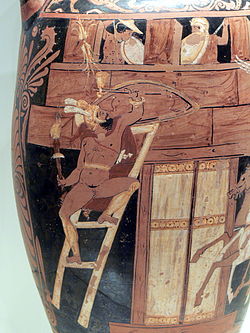Seven against Thebes

Red-figure neck amphora from Campania , around 340 BC BC ( J. Paul Getty Museum , Malibu, California).
Seven against Thebes ( ancient Greek Ἑπτὰ ἐπὶ Θήβας , Hepta epi Thēbas ) is the last and only surviving part of the "Theban Trilogy" by the Greek playwright Aeschylus , with which he worked in 467 BC. Victorious at the Dionysia in Athens . The tragedy is about the battle of the brothers Eteocles and Polynices for power in Thebes , which is known in the Theban sagas of Greek mythology under the names First Theban War and Train of the Seven against Thebes . The lost parts were called Laios and Oidipous and the common motif of the pieces, also known as the Oedipus Trilogy, was probably the sons' penance for the sins of their fathers.
prehistory
The oracle of Delphi had foretold Laios , king of Thebes, that he would save the city if he remained childless. But Laios became the father of Oedipus . The oracle prophesied that he would kill his father and marry his mother. The first part of the trilogy probably dealt with the death of Laios, whom Oedipus killed - without recognizing him as his father. The second part was probably dedicated to the discovery of the fact as it can be reconstructed from parallel traditions of the myth. While searching for the murderer of Laios, Oedipus learns that he himself is the murderer and the son of the victim. He also realizes that his wife Iokaste is his own mother. Shocked that the oracle's one-time prophecy has come true, he blinds himself and resigns as King of Thebes. Iokaste hangs himself. The marriage between Oedipus and his mother had four children: Eteocles , Polynices , Antigone and Ismene .
content
The two sons Eteocles and Polynices take over the kingdom and agree to rule alternately each year. However, they do not give Oedipus the impression that they are interested in the reign, so that he reprimands them for their negligence. After the first year, Eteocles refuses to resign, so that Polynices attacks Thebes with his allies (the Seven against Thebes). The battle is now fought in seven individual fights. The last pairing provides for a fratricidal battle in which Eteocles and Polynices perish, but the city is saved. The brothers are brought into the palace from the seventh gate and mourned first by two women's choirs, then by the sisters Ismene and Antigone in a lament. Probably a later expansion of the poetry is the appearance of a messenger who announces that Eteocles should be buried, but that Polynices should be thrown to the animals to eat. This theme leads over to the subject area of the Antigone myth, as it was processed in the Antigone of Sophocles .
| goal | attacker | defender |
|---|---|---|
| Proitides | Tydeus | Melanippos |
| Elektrai | Capaneus | Polyphantes |
| Neïstai | Adrastos | Megareus |
| Onkaiai | Hippomedon | Hyperbiosis |
| Borrhaiai | Parthenopaios | Actuator |
| Homoloides | Amphiaraos | Lasthenes |
| Hypsistai | Polynices | Eteocles |
The attackers in Thebes included:
- Adrastos (the only survivor)
- Amphiaraos
- Hippomedon
- Capaneus
- Parthenopaios
- Polynices
- Tydeus
The defenders of Thebes included:
- Eteocles
- Hyperbiosis
- his brother actor
- Creon
- Lasthenes
- Megareus
- Melanippos
- Polyphantes
Editions, comments and translations
- Aeschyli tragoediae. Cum incerti poetae Prometheo (= Bibliotheca scriptorum Graecorum et Romanorum Teubneriana ). Edidit Martin L. West . Editio correctior editionis primae. Teubner, Stuttgart et al. 1998, ISBN 3-519-11013-X .
- Aeschylus: Seven against Thebes. Edited with Introduction and Commentary by Gregory O. Hutchinson. Clarendon Press, Oxford 1985, ISBN 0-19-814999-9 .
- Aeschylus: The Persians. Seven against Thebes (= Universal Library. No. 510). Translation, notes and epilogue by Emil Staiger . Reclam, Stuttgart 1997, ISBN 3-15-000510-8 .
- Aeschylus: Seven against Thebes (= Edition Suhrkamp 3431). Reproduced by Durs Grünbein . Suhrkamp, Frankfurt am Main 2003, ISBN 3-518-13431-0 .
- Aeschylus: Tragedies (= Tusculum Collection ). Translation by Oskar Werner . Edited by Bernhard Zimmermann , 6th edition. Artemis & Winkler, Düsseldorf et al. 2005, ISBN 3-7608-1501-4 .
- Aeschylus: Seven against Thebes. Translation, notes and epilogue by Horst-Dieter Blume . Reclam, Stuttgart 2017, ISBN 978-3-15-019434-8 .
Individual evidence
- ↑ In: Herbert Jennings Rose : Greek Mythology. A manual (= Beck series 1530). CH Beck, Munich, 2003, ISBN 3-406-49458-7 , p. 185.
Web links
- Seven against Thebes - translation by Johann Gustav Droysen in the Gutenberg project
- Seven against Thebes - English prose translation by Herbert Weir Smyth in the Perseus Project (with versification)